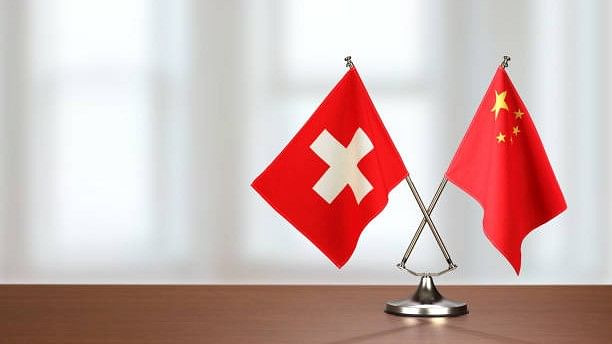
Switzerland and China flag
Credit: iStock Photo
Beijing: China will not attend a Ukraine peace conference in Switzerland next month because it does not meet its expectations, which include both Russia and Ukraine taking part, the Chinese Foreign Ministry said on Friday, confirming an exclusive Reuters report.
Switzerland is seeking a broad-based turnout from different parts of the world for the summit in mid-June, which Bern hopes will lay the groundwork for a peace process in Ukraine. Moscow was not invited and dismisses the talks as meaningless without its participation.
"The arrangements for the meeting still fall far short of China's requests and the general expectations of the international community, making it difficult for China to participate," Chinese Foreign Ministry spokesperson Mao Ning said at a routine briefing.
"China has always insisted that an international peace conference should be endorsed by both Russia and Ukraine, with the equal participation of all parties, and that all peace proposals should be discussed in a fair and equal manner. Otherwise it will be difficult for it to play a substantive role in restoring peace."
China briefed some diplomats this week that it had declined the invitation, saying that its conditions had not been met, four sources told Reuters earlier.
These included that the conference should be recognised by both Russia and Ukraine, there should be equal participation by all parties, and there should be fair discussion of all proposals, one of the sources said.
Russian Foreign Minister Sergey Lavrov suggested on Thursday that China could arrange a peace conference in which Russia and Ukraine take part.
During a visit to China this month, Russian President Vladimir Putin said Ukraine may use the Swiss talks to try to get a broader group of countries to back Ukrainian President Volodymyr Zelenskiy's demand for a total Russian withdrawal. Putin also expressed backing for China's plan for a peaceful settlement of the crisis, saying that Beijing had a full understanding of what lay behind the crisis.
China's 12-Point Plan
Russia and China proclaimed a "no limits" relationship just days before Moscow launched its invasion of Ukraine in February 2022, but Beijing has so far avoided providing actual weapons and ammunition for Russia's war effort.
Beijing put forward a 12-point paper more than a year ago that set out general principles for ending the war, but did not get into specifics. More recently, China and Brazil signed a joint statement calling for Russia-Ukraine peace talks last week.
Ukraine in January invited Chinese President Xi Jinping to participate in the planned summit of world leaders in Switzerland. Zelenskiy this week urged U.S. President Joe Biden to attend, but Washington has not confirmed who it will send.
China's ambassador to Switzerland in March said Beijing would consider taking part in the conference. Chinese representatives attended one preparatory meeting for the summit last summer in Jeddah, Saudi Arabia.
China's special envoy for Eurasian affairs, Li Hui, has carried out three rounds of shuttle diplomacy between various European and Middle Eastern countries, Ukraine and Russia since the invasion began.
In the latest round this month, Beijing put forward proposals on supporting the exchange of prisoners of war, opposing the use of nuclear and biological weapons and opposing armed attacks on civilian nuclear facilities, according to a Chinese foreign ministry readout.
But several European leaders and the United States have repeatedly urged China to do more to curb exports of dual-use items and critical components propping up Russia's industrial defence base, which U.S. Secretary of State Antony Blinken has called "the biggest threat to European security since the end of the Cold War".
China insists that its dual-use exports are subject to oversight and that it maintains normal trade relations with Russia.
The Ukrainian, Russian and Swiss embassies did not immediately respond to requests for comment.
Switzerland was seeking to persuade more Global South countries, as well as China, to attend the conference.